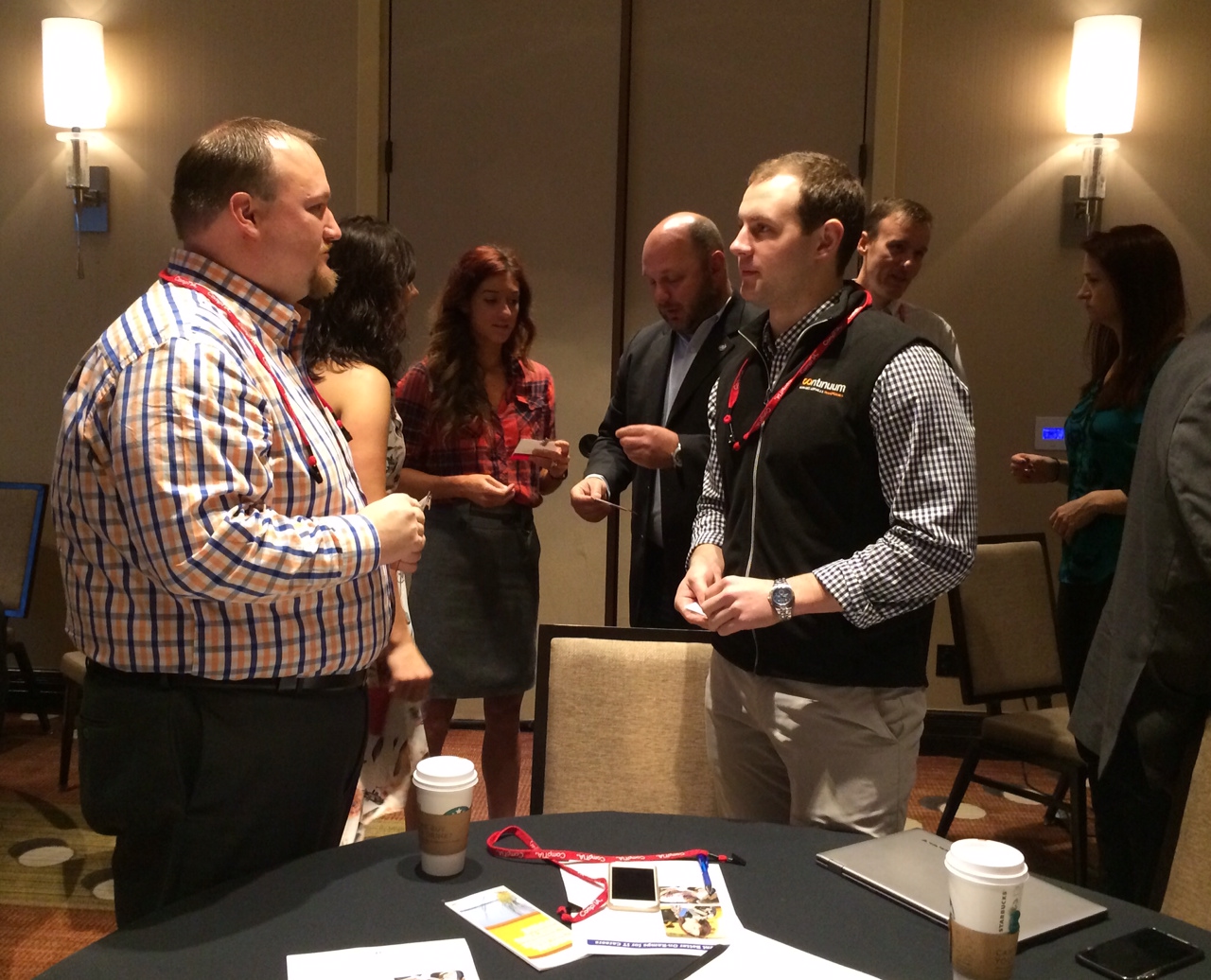 CompTIA’s Future Leaders Community covered a lot of ground during its first formal face-to-face meeting on Tuesday, held in conjunction with CompTIA’s Annual Member Meeting. Still in its infancy, the group began defining its mission, coming up with initiatives for the coming year and talking about ways to grow the group in 2015.
CompTIA’s Future Leaders Community covered a lot of ground during its first formal face-to-face meeting on Tuesday, held in conjunction with CompTIA’s Annual Member Meeting. Still in its infancy, the group began defining its mission, coming up with initiatives for the coming year and talking about ways to grow the group in 2015.
“We need to work on identifying what everyone’s experience is and realize we’re all going through the same thing,” said Lauren Brekke, of McAfee Inc., and a member of the Future Leaders steering committee.
Bridging the Generation Gap
She and other members of the Future Leaders steering committee spread out among the five tables to facilitate small conversations on big topics: What’s the future of this community? How do we keep people engaged and ways people can contribute, even if they’re introverts or new to the industry. In the roundtable discussions, the group of 30 talked about ways to foster sharing between generations and how the new batch of IT leaders can grow within their communities and provide guidance for others.
“All generations still have quite a bit to learn from each other,” said 2014 ChannelChanger Rory Jackson, of Business Continuity Technologies. “There’s plenty we can teach you and plenty you can teach us.”
Community chair Brittani Von Roden said the industry will have to adjust to a new generation of workers who respond to flexibility over “Coffee is for closers”-style management, and creative efficiencies over traditional process.
“We want millennials and members of the Future Leaders to join other CompTIA Communities to bridge those gaps,” Von Roden said. “We just work differently and we have to adapt the way we go through our careers.”
Millennials also have different career expectations, especially in IT. “You come out of college hearing about how you’ll get a great job and suddenly everyone’s like, ‘No, you’re not going to make $100,000 this year.’ Half the kids I went to school with aren’t in the industry anymore because they thought they’d go to school and get a job — they didn’t realize they’d have to work hard to get there,” Jackson said.
“Millennials need to earn their stripes,” Von Roden echoed. “You’re not going to end up in management the second you leave college.”
Generational Differences
The group agreed that millennials interact differently in the workplace than baby boomers, but those differences can be leveraged.
“When I first started this company, I had five generations of people working for me,” said Chad Paalman, head of NuWave Technology Partners. “I’ve seen everything from the 70-year-old to the 20-year-old, and everyone feels like their ideas are important and matter. This is a generational thing I saw that we can’t lose focus on.”
The group discussed ways to prioritize what can be changed and how to understand the differences that likely won’t change. “As you get older, you tend to get a little more set in your ways and the one thing I’d want to make sure to nurture is to keep an open mind instead of simply poking holes in something, just for the sake of it,” said Kenneth May, of Swift Chip.
Company culture needs to work from the top down and encourages soft skills and open communication. “We need to help millennials understand the larger scope of technology and technology’s history,” said ChannelChanger Nate Teplow, of Continuum Managed IT Services. “We need to make sure we understand that, where we are and where things are going … People don’t think millennials understand business and how IT is there to support business.”
The Future Leaders also heard a presentation by Charles Eaton of CompTIA’s Creating IT Futures Foundation on the technology aspect of STEM and how IT companies small and large can offer mentorships and internships to help grow a new generation of the IT workforce.
Initiatives for 2015
The group discussed a variety of initiatives it might take on for 2015, from a quick start guide to industry acronyms to working gamification into the recruitment process. They also considered segmented types of onboarding, either in timed-out layers of information or segmented by job or title.
Mentorships also came up frequently, with proposals to help companies establish mentorship programs through HR or using a third party organization to recruit people and foster a natural mentorship culture. “I was lucky to have mentors who could teach me the skills I’d need, mostly with customer interactions,” Jackson said.
The group considered ways a millennial mentorship might help integrate young employees into the workplace and the company culture. They also discussed the other side, helping millennials understand the importance of mentorships and what IT companies look for when they want to mentor people.
“A lot of this has to do with the stereotypes, and it’s reminding us that all generations have something to learn and something to teach,” said Phillips.
Become A Future Leader
CompTIA’s Future Leaders Community is open to all, no matter what age, to avoid creating a community in a vacuum. A Facebook group is in the works, and you can connect with the group now through LinkedIn. “If every single member of the community simple got one more person to join, we’d double our membership,” encouraged community leader Chris Phillips. The group will meet in person at ChannelCon in Chicago, and conduct regular online meetings throughout the year. Click here to join.
Michelle Peterson is a communications specialist for CompTIA.
